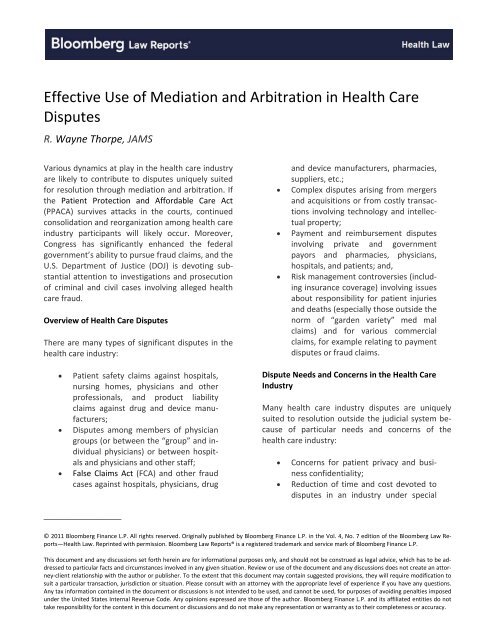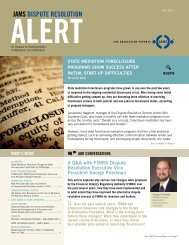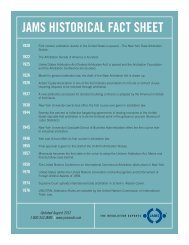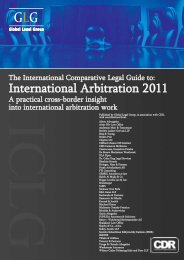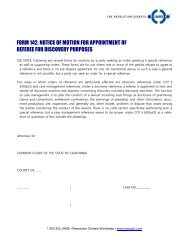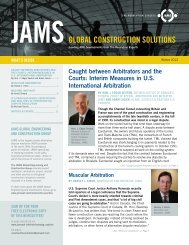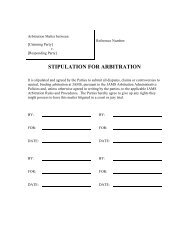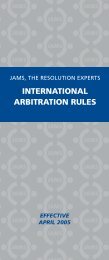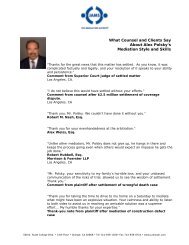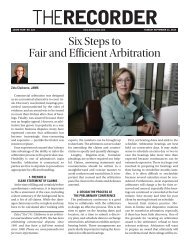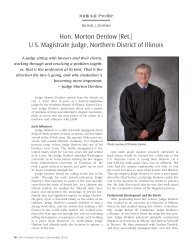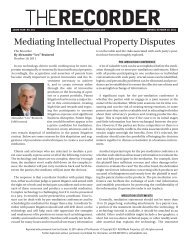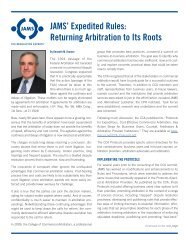Effective Use of Mediation and Arbitration in Health Care ... - Jams
Effective Use of Mediation and Arbitration in Health Care ... - Jams
Effective Use of Mediation and Arbitration in Health Care ... - Jams
Create successful ePaper yourself
Turn your PDF publications into a flip-book with our unique Google optimized e-Paper software.
<strong>Effective</strong> <strong>Use</strong> <strong>of</strong> <strong>Mediation</strong> <strong>and</strong> <strong>Arbitration</strong> <strong>in</strong> <strong>Health</strong> <strong>Care</strong>DisputesR. Wayne Thorpe, JAMSVarious dynamics at play <strong>in</strong> the health care <strong>in</strong>dustryare likely to contribute to disputes uniquely suitedfor resolution through mediation <strong>and</strong> arbitration. Ifthe Patient Protection <strong>and</strong> Affordable <strong>Care</strong> Act(PPACA) survives attacks <strong>in</strong> the courts, cont<strong>in</strong>uedconsolidation <strong>and</strong> reorganization among health care<strong>in</strong>dustry participants will likely occur. Moreover,Congress has significantly enhanced the federalgovernment’s ability to pursue fraud claims, <strong>and</strong> theU.S. Department <strong>of</strong> Justice (DOJ) is devot<strong>in</strong>g substantialattention to <strong>in</strong>vestigations <strong>and</strong> prosecution<strong>of</strong> crim<strong>in</strong>al <strong>and</strong> civil cases <strong>in</strong>volv<strong>in</strong>g alleged healthcare fraud.Overview <strong>of</strong> <strong>Health</strong> <strong>Care</strong> DisputesThere are many types <strong>of</strong> significant disputes <strong>in</strong> thehealth care <strong>in</strong>dustry:• Patient safety claims aga<strong>in</strong>st hospitals,nurs<strong>in</strong>g homes, physicians <strong>and</strong> otherpr<strong>of</strong>essionals, <strong>and</strong> product liabilityclaims aga<strong>in</strong>st drug <strong>and</strong> device manufacturers;• Disputes among members <strong>of</strong> physiciangroups (or between the “group” <strong>and</strong> <strong>in</strong>dividualphysicians) or between hospitals<strong>and</strong> physicians <strong>and</strong> other staff;• False Claims Act (FCA) <strong>and</strong> other fraudcases aga<strong>in</strong>st hospitals, physicians, drug<strong>and</strong> device manufacturers, pharmacies,suppliers, etc.;• Complex disputes aris<strong>in</strong>g from mergers<strong>and</strong> acquisitions or from costly transactions<strong>in</strong>volv<strong>in</strong>g technology <strong>and</strong> <strong>in</strong>tellectualproperty;• Payment <strong>and</strong> reimbursement disputes<strong>in</strong>volv<strong>in</strong>g private <strong>and</strong> governmentpayors <strong>and</strong> pharmacies, physicians,hospitals, <strong>and</strong> patients; <strong>and</strong>,• Risk management controversies (<strong>in</strong>clud<strong>in</strong>g<strong>in</strong>surance coverage) <strong>in</strong>volv<strong>in</strong>g issuesabout responsibility for patient <strong>in</strong>juries<strong>and</strong> deaths (especially those outside thenorm <strong>of</strong> “garden variety” med malclaims) <strong>and</strong> for various commercialclaims, for example relat<strong>in</strong>g to paymentdisputes or fraud claims.Dispute Needs <strong>and</strong> Concerns <strong>in</strong> the <strong>Health</strong> <strong>Care</strong>IndustryMany health care <strong>in</strong>dustry disputes are uniquelysuited to resolution outside the judicial system because<strong>of</strong> particular needs <strong>and</strong> concerns <strong>of</strong> thehealth care <strong>in</strong>dustry:• Concerns for patient privacy <strong>and</strong> bus<strong>in</strong>essconfidentiality;• Reduction <strong>of</strong> time <strong>and</strong> cost devoted todisputes <strong>in</strong> an <strong>in</strong>dustry under special________________© 2011 Bloomberg F<strong>in</strong>ance L.P. All rights reserved. Orig<strong>in</strong>ally published by Bloomberg F<strong>in</strong>ance L.P. <strong>in</strong> the Vol. 4, No. 7 edition <strong>of</strong> the Bloomberg Law Reports—<strong>Health</strong>Law. Repr<strong>in</strong>ted with permission. Bloomberg Law Reports® is a registered trademark <strong>and</strong> service mark <strong>of</strong> Bloomberg F<strong>in</strong>ance L.P.This document <strong>and</strong> any discussions set forth here<strong>in</strong> are for <strong>in</strong>formational purposes only, <strong>and</strong> should not be construed as legal advice, which has to be addressedto particular facts <strong>and</strong> circumstances <strong>in</strong>volved <strong>in</strong> any given situation. Review or use <strong>of</strong> the document <strong>and</strong> any discussions does not create an attorney‐clientrelationship with the author or publisher. To the extent that this document may conta<strong>in</strong> suggested provisions, they will require modification tosuit a particular transaction, jurisdiction or situation. Please consult with an attorney with the appropriate level <strong>of</strong> experience if you have any questions.Any tax <strong>in</strong>formation conta<strong>in</strong>ed <strong>in</strong> the document or discussions is not <strong>in</strong>tended to be used, <strong>and</strong> cannot be used, for purposes <strong>of</strong> avoid<strong>in</strong>g penalties imposedunder the United States Internal Revenue Code. Any op<strong>in</strong>ions expressed are those <strong>of</strong> the author. Bloomberg F<strong>in</strong>ance L.P. <strong>and</strong> its affiliated entities do nottake responsibility for the content <strong>in</strong> this document or discussions <strong>and</strong> do not make any representation or warranty as to their completeness or accuracy.
economic, political, <strong>and</strong> social pressuresto control costs;• Timely elim<strong>in</strong>ation <strong>of</strong> disputes thatthreaten the very existence <strong>of</strong> participants(e.g., government fraud claimsthat may threaten crim<strong>in</strong>al exposure<strong>and</strong> exclusion from government contract<strong>in</strong>g<strong>in</strong>clud<strong>in</strong>g Medicare <strong>and</strong> Medicaid);• Management <strong>of</strong> important relationshipswith <strong>in</strong>vestors, lenders <strong>and</strong> f<strong>in</strong>ancialanalysts; employees/staff; <strong>and</strong> customers,vendors, <strong>and</strong> other bus<strong>in</strong>ess “partners”—all<strong>of</strong> which can suffer greatly <strong>in</strong>the midst <strong>of</strong> an ugly public dispute;• Preservation <strong>of</strong> on‐go<strong>in</strong>g bus<strong>in</strong>ess relationshipsamong disputants, particularly<strong>in</strong> the context <strong>of</strong> exp<strong>and</strong><strong>in</strong>g bus<strong>in</strong>esses,a consolidat<strong>in</strong>g <strong>in</strong>dustry, <strong>and</strong> development<strong>of</strong> new bus<strong>in</strong>ess relationships;• Elim<strong>in</strong>ation <strong>of</strong> bus<strong>in</strong>ess <strong>and</strong> personaldistractions among highly tra<strong>in</strong>ed <strong>and</strong>highly compensated pr<strong>of</strong>essional staffwho truly “have better th<strong>in</strong>gs to do”(i.e., treat<strong>in</strong>g patients <strong>and</strong> produc<strong>in</strong>grevenue) than spend<strong>in</strong>g days <strong>in</strong> conferencerooms <strong>and</strong> courtrooms with lawyers<strong>and</strong> adm<strong>in</strong>istrators;• A particular aversion to public controversyon the part <strong>of</strong> educational <strong>and</strong> religiousorganizations who <strong>of</strong>ten ownhealth care facilities or play other importantroles <strong>in</strong> the delivery <strong>of</strong> healthcare services; <strong>and</strong>• Satisfaction <strong>of</strong> the patient safety concernsf<strong>in</strong>d<strong>in</strong>g expression <strong>in</strong> the Jo<strong>in</strong>tCommission St<strong>and</strong>ards requirementsfor conflict management systems.Overview <strong>of</strong> <strong>Health</strong> <strong>Care</strong> ADRIn mediation, a dis<strong>in</strong>terested, impartial third‐partycan assist parties <strong>and</strong> their counsel <strong>in</strong> effectivelycommunicat<strong>in</strong>g their respective positions to eachother <strong>and</strong> <strong>in</strong> negotiat<strong>in</strong>g a settlement. As appropriate,the mediator may provide questions, comments,observations or op<strong>in</strong>ions about parties’ positions<strong>and</strong> may make suggestions or proposals abouthow to settle the dispute. A settlement reached <strong>in</strong>mediation is documented <strong>in</strong> a b<strong>in</strong>d<strong>in</strong>g contract enforceable<strong>in</strong> court. In arbitration, a dis<strong>in</strong>terested,impartial third‐party will make b<strong>in</strong>d<strong>in</strong>g decisionsresolv<strong>in</strong>g the dispute <strong>and</strong> enter an award that canbe enforced <strong>in</strong> court, although the decisions have aloud r<strong>in</strong>g <strong>of</strong> f<strong>in</strong>ality to them because courts will onlyrarely review arbitration decisions. In bothprocesses the mediator or arbitrator will assist parties<strong>in</strong> exchang<strong>in</strong>g sufficient evidence <strong>and</strong> other <strong>in</strong>formationto make the process <strong>in</strong>formed <strong>and</strong> fair.<strong>Mediation</strong> <strong>and</strong> arbitration can address particularneeds <strong>of</strong> disputants <strong>in</strong> health care <strong>in</strong> various ways:• <strong>Mediation</strong> <strong>and</strong> arbitration are more private<strong>and</strong> confidential than court proceed<strong>in</strong>gs;even required public release<strong>of</strong> <strong>in</strong>formation about a dispute is bettercontrolled <strong>in</strong> managed privateprocesses than a multi‐year publicbrawl <strong>in</strong> a courtroom potentially full <strong>of</strong>reporters <strong>and</strong> competitors;• Any form <strong>of</strong> ADR should be quicker toresolution at materially reduced cost<strong>and</strong> with greater f<strong>in</strong>ality than disputes<strong>in</strong> the judicial system;• ADR proceed<strong>in</strong>gs allow for utilization <strong>of</strong>dispute resolution pr<strong>of</strong>essionals withapplicable dispute resolution expertise,plus relevant regulatory, scientific orother health care subject matter expertiseas needed;• ADR processes provide an opportunityfor thoughtful resolution <strong>of</strong> emotional<strong>and</strong> highly charged disputes surround<strong>in</strong>gmedical errors, patient safety, end<strong>of</strong> life, bio‐ethics, <strong>and</strong> <strong>in</strong>ter‐staff controversy;• <strong>Mediation</strong> can provide a forum for resolv<strong>in</strong>gdisputes among multiple participantswho might not always be parties© 2011 Bloomberg F<strong>in</strong>ance L.P. All rights reserved. Orig<strong>in</strong>ally published by Bloomberg F<strong>in</strong>ance L.P. <strong>in</strong> the Vol. 4, No. 7 edition <strong>of</strong> the Bloomberg Law Reports—<strong>Health</strong>Law. Repr<strong>in</strong>ted with permission. Bloomberg Law Reports® is a registered trademark <strong>and</strong> service mark <strong>of</strong> Bloomberg F<strong>in</strong>ance L.P.
to the same lawsuit, <strong>and</strong> can devise solutionssometimes not available <strong>in</strong>court.Current <strong>Use</strong> <strong>of</strong> ADR <strong>in</strong> <strong>Health</strong> <strong>Care</strong>Although at least three organizations (JAMS, American<strong>Arbitration</strong> Association, American <strong>Health</strong> LawyersAssociation (AHLA)) <strong>of</strong>fer health carespecializedpanels <strong>of</strong> mediators <strong>and</strong> arbitrators, thehealth care <strong>in</strong>dustry has been slow to adopt ADR.There could be many possible explanations whyADR is underutilized <strong>in</strong> health care. One possibleexplanation is that health care lawyers as a groupmight not have the same opportunities for exposureto mediation <strong>and</strong> arbitration as full‐time litigationcounsel (th<strong>in</strong>k employment, construction, <strong>in</strong>surancedefense <strong>and</strong> family law) who may participate <strong>in</strong> adozen or more mediations or arbitrations per year.Many health care lawyers are “specialists” <strong>in</strong> everysense <strong>of</strong> the word, but they are <strong>of</strong>ten “health carespecialists” who work with their health care clientson a variety <strong>of</strong> regulatory, transactional <strong>and</strong> litigationlegal issues. Other health care lawyers, especially<strong>in</strong> the health fraud bar, have come to healthlaw practice after years <strong>of</strong> practice <strong>in</strong> white collarcrim<strong>in</strong>al prosecution <strong>and</strong> defense work with littleADR experience. Some private lawyers <strong>in</strong> fraud casesare skeptical about whether government agenciesare genu<strong>in</strong>ely <strong>in</strong>terested <strong>in</strong> mediat<strong>in</strong>g fraudcases, although anecdotal <strong>in</strong>terviews with both private<strong>and</strong> government lawyers reflect both genu<strong>in</strong>e<strong>in</strong>terest <strong>and</strong> successful experience on the part <strong>of</strong>both federal <strong>and</strong> state governments <strong>in</strong> mediat<strong>in</strong>gappropriate health fraud cases.Aga<strong>in</strong>st this backdrop, there are many types <strong>of</strong>health care disputes <strong>in</strong> which ADR can make a positiveimpact. Two particular examples <strong>in</strong>clude disputesrelated to pr<strong>of</strong>essional bus<strong>in</strong>ess relationships<strong>of</strong> physicians <strong>and</strong> government health care fraudcases.Government Fraud CasesAmong the most difficult disputes fac<strong>in</strong>g participants<strong>in</strong> the health care <strong>in</strong>dustry are FCA casesbrought by federal or state agencies (<strong>of</strong>ten <strong>in</strong>itiatedby relators) for alleged fraud <strong>in</strong> connection withpayments under government health care programs<strong>in</strong>clud<strong>in</strong>g Medicare <strong>and</strong> Medicaid. The high stakes<strong>in</strong>volved <strong>in</strong> these cases is one important reason whyparties should carefully consider attempt<strong>in</strong>g settlementthrough mediation.Federal False Claims cases can result <strong>in</strong> civil penalties<strong>in</strong>clud<strong>in</strong>g treble damages plus $5500 to $11,000per claim, corporate <strong>and</strong> <strong>in</strong>dividual crim<strong>in</strong>al liability,<strong>and</strong> exclusion from government health care programs.Most states provide for similar liabilities. TheU.S. Department <strong>of</strong> Justice has reported that it recoveredover $2.5 billion <strong>in</strong> 2010 <strong>and</strong> $4.6 billions<strong>in</strong>ce January 2009 <strong>in</strong> health care fraud cases. Severalreported recoveries aga<strong>in</strong>st pharmaceutical <strong>and</strong>device companies have exceeded $100 million. Accord<strong>in</strong>gto the U.S. Department <strong>of</strong> Justice, “Fight<strong>in</strong>gfraud committed aga<strong>in</strong>st public health care programsis a top priority for the Obama Adm<strong>in</strong>istration.”http://www.justice.gov/opa/pr/2010/November/10‐civ‐1335.html.Recent legislative changes have enhanced the ability<strong>of</strong> the federal government <strong>and</strong> FCA qui tam relatorsto pursue False Claims:• PPACA § 6402 amended the federal Anti‐KickbackLaw to make clear that violations<strong>of</strong> the Anti‐Kickback Law can bebrought under the FCA.• The Fraud Enforcement <strong>and</strong> RecoveryAct (FERA) imposed FCA liability foroverpayments, exp<strong>and</strong>ed DOJ’s powerto issue civil <strong>in</strong>vestigative dem<strong>and</strong>s, <strong>and</strong>amended the FCA anti‐retaliation pro‐© 2011 Bloomberg F<strong>in</strong>ance L.P. All rights reserved. Orig<strong>in</strong>ally published by Bloomberg F<strong>in</strong>ance L.P. <strong>in</strong> the Vol. 4, No. 7 edition <strong>of</strong> the Bloomberg Law Reports—<strong>Health</strong>Law. Repr<strong>in</strong>ted with permission. Bloomberg Law Reports® is a registered trademark <strong>and</strong> service mark <strong>of</strong> Bloomberg F<strong>in</strong>ance L.P.
visions to protect contractors <strong>and</strong>agents <strong>in</strong> addition to employees.• PPACA further def<strong>in</strong>ed overpaymentliability to provide that retention <strong>of</strong> anoverpayment for over 60 days afteridentification by a provider can becomea false claim.Government <strong>in</strong>vestigations <strong>of</strong> possible FCA casesprovide opportunities to use mediation to satisfyimportant goals <strong>and</strong> <strong>in</strong>terests <strong>of</strong> both government<strong>and</strong> accused, while also potentially sav<strong>in</strong>g time,money <strong>and</strong> other important resources. The consequencesto private bus<strong>in</strong>esses <strong>of</strong> an FCA case arepotentially catastrophic <strong>in</strong> the form <strong>of</strong> monetary,crim<strong>in</strong>al, <strong>and</strong> exclusion liabilities. A mediated settlementagreement may avoid (or at least dim<strong>in</strong>ish)exclusion <strong>and</strong> crim<strong>in</strong>al responsibility while quantify<strong>in</strong>gcivil monetary exposure at a known, agreedupon level. Even where a potential FCA defendantgenu<strong>in</strong>ely (<strong>and</strong> perhaps correctly) views a potentialclaim as defensible, such an approach to mediation<strong>and</strong> settlement may <strong>of</strong>ten have some merit because,among other reasons, a defendant can utilizea mediated settlement to avoid the potentiallyenormous f<strong>in</strong>ancial cost <strong>of</strong> lengthy further <strong>in</strong>vestigation,discovery, motion practice, <strong>and</strong> trial, theadverse impact on relationships, <strong>and</strong> a dra<strong>in</strong> on thetime <strong>and</strong> energies <strong>of</strong> senior management <strong>and</strong> legalpersonnel. From the government’s perspective,substantial <strong>and</strong> adequate f<strong>in</strong>ancial payments can berecovered without the time, risk, <strong>and</strong> cost attendantto a trial aga<strong>in</strong>st a well‐heeled <strong>and</strong> committeddefendant. Similarly, governments can devote verysubstantial, but nonetheless limited, f<strong>in</strong>ancial, legal,<strong>and</strong> <strong>in</strong>vestigatory resources to health care fraudcases, <strong>and</strong> a mediated settlement may allow governmentagencies to move on to other important<strong>in</strong>vestigations.When a mediation occurs prior to the unseal<strong>in</strong>g <strong>of</strong> arelator’s FCA compla<strong>in</strong>t, a defendant may also havea chance to v<strong>in</strong>dicate an <strong>in</strong>terest <strong>in</strong> privacy, or atleast <strong>in</strong> dim<strong>in</strong>ished public <strong>and</strong> media scrut<strong>in</strong>y. A defendant’ssettlement <strong>of</strong> an FCA case will be public<strong>and</strong> likely publicized with some fanfare. But on theday after the announcement, <strong>in</strong>vestors, lenders,f<strong>in</strong>ancial analysts, employees, vendors, customers,<strong>and</strong> other key constituencies will start to view theissue <strong>in</strong> the rear‐view mirror, rather than throughthe cont<strong>in</strong>u<strong>in</strong>g scrut<strong>in</strong>y <strong>of</strong> a pend<strong>in</strong>g case with a stilluncerta<strong>in</strong> outcome. The government <strong>in</strong> turn gets achance to make a splashy announcement, satisfy<strong>in</strong>gthe important goal <strong>of</strong> potentially deterr<strong>in</strong>g futureputative wrongdoers, without the cost <strong>of</strong> a longer<strong>in</strong>vestigation <strong>and</strong> trial, <strong>and</strong> without the risk <strong>of</strong> send<strong>in</strong>gthe wrong deterrence message if the trial is notsuccessful.F<strong>in</strong>ally, use <strong>of</strong> mediation <strong>in</strong> government fraud casesprovides a “forum” for resolution <strong>of</strong> issues withmultiple parties <strong>and</strong> agencies. Settlement <strong>of</strong> quitam matters under the FCA can be particularly challeng<strong>in</strong>gbecause each settlement typically has multipleparties, <strong>in</strong>clud<strong>in</strong>g DOJ, the Inspector General <strong>of</strong>HHS (which has adm<strong>in</strong>istrative authority to excludethe defendant from Medicare), the relator(s), <strong>and</strong>the defendant(s). If a defendant seeks a release <strong>of</strong>any state liability for Medicaid claims, a settlementwill also require the <strong>in</strong>volvement <strong>of</strong> state authorities,which ord<strong>in</strong>arily <strong>in</strong>clude a state Assistant AttorneyGeneral, <strong>and</strong> sometimes many <strong>of</strong> them. AlthoughDOJ <strong>and</strong> most state Attorneys General willrequire most FCA settlements to be approved atvarious levels <strong>of</strong> management (for example, AssistantU.S. Attorneys <strong>and</strong> trial counsel at DOJ cannotord<strong>in</strong>arily make b<strong>in</strong>d<strong>in</strong>g settlement <strong>of</strong>fers <strong>and</strong>commitments), this challenge should rarely be significantbecause f<strong>in</strong>al, “<strong>of</strong>ficial” higher levels <strong>of</strong> approvalare obta<strong>in</strong>ed rout<strong>in</strong>ely <strong>in</strong> the mediation <strong>and</strong>settlement <strong>of</strong> many types <strong>of</strong> cases <strong>in</strong>volv<strong>in</strong>g federal,state, <strong>and</strong> local governments.ADR <strong>in</strong> Physician Bus<strong>in</strong>ess/Employment DisputesWhen physicians’ relationships with one another orwith other providers are fractured, a host <strong>of</strong> claimsmay ensue, <strong>in</strong>clud<strong>in</strong>g: for repayment <strong>of</strong> loans; forbreach <strong>of</strong> non‐compete, non‐solicitation, <strong>and</strong> antitheftprovisions; for breach <strong>of</strong> fiduciary duty; for© 2011 Bloomberg F<strong>in</strong>ance L.P. All rights reserved. Orig<strong>in</strong>ally published by Bloomberg F<strong>in</strong>ance L.P. <strong>in</strong> the Vol. 4, No. 7 edition <strong>of</strong> the Bloomberg Law Reports—<strong>Health</strong>Law. Repr<strong>in</strong>ted with permission. Bloomberg Law Reports® is a registered trademark <strong>and</strong> service mark <strong>of</strong> Bloomberg F<strong>in</strong>ance L.P.
violation <strong>of</strong> federal, state <strong>and</strong> local laws prohibit<strong>in</strong>gemployment discrim<strong>in</strong>ation; <strong>and</strong> for violation <strong>of</strong>federal <strong>and</strong> state anti‐fraud laws. Both mediation<strong>and</strong> arbitration can potentially assist parties <strong>in</strong> atta<strong>in</strong><strong>in</strong>gseveral <strong>of</strong>ten mutually shared goals <strong>in</strong> thesephysician fights.When physicians’ bus<strong>in</strong>ess arrangements with oneanother sour, a pr<strong>in</strong>cipal goal is (or should be) to getthe bus<strong>in</strong>ess <strong>and</strong> legal issues resolved quickly, <strong>in</strong>expensively,<strong>and</strong> fairly. Many <strong>of</strong> these bus<strong>in</strong>ess organizations<strong>and</strong> contracts can benefit from contractualrequirements that the parties arbitrate all disputesamong the parties. These disputes <strong>of</strong>ten escalate<strong>in</strong>to ugly charges among former colleagues aboutquality <strong>of</strong> care, bill<strong>in</strong>g legalities, employment discrim<strong>in</strong>ation<strong>and</strong> harassment, or “steal<strong>in</strong>g” patients,employees, <strong>and</strong> technology. Ord<strong>in</strong>arily, neither sidebenefits from air<strong>in</strong>g those charges publicly. A welldrafted arbitration clause <strong>in</strong> the organizational documentsfor a pr<strong>of</strong>essional practice or other contractdocument<strong>in</strong>g the bus<strong>in</strong>ess arrangements betweenphysicians can require an appropriate type <strong>of</strong> expertiseon the part <strong>of</strong> the arbitrator (<strong>in</strong>clud<strong>in</strong>g certa<strong>in</strong>types or years <strong>of</strong> experience as arbitrator <strong>and</strong>/or <strong>in</strong>health care cases), <strong>and</strong> a hear<strong>in</strong>g with<strong>in</strong> a fewmonths after an exchange <strong>of</strong> necessary documents<strong>and</strong> <strong>in</strong>formation but without the lengthy contentiousdiscovery process that <strong>of</strong>ten makes litigation<strong>in</strong> the courts so protracted <strong>and</strong> costly. A bus<strong>in</strong>essarbitration, when properly managed by an experiencedarbitrator, should almost always be quicker<strong>and</strong> less costly than a comparable lawsuit <strong>in</strong> court.<strong>Mediation</strong>s <strong>in</strong> physician disputes are particularlywell suited to focus<strong>in</strong>g the parties on the real bus<strong>in</strong>essdisputes need<strong>in</strong>g resolution <strong>and</strong> away from the<strong>in</strong>evitable hurt feel<strong>in</strong>gs <strong>and</strong> sometimes exaggeratedmutual claims <strong>of</strong> personal <strong>and</strong> pr<strong>of</strong>essional misconduct.<strong>Mediation</strong> is private <strong>and</strong> confidential <strong>and</strong> canresult <strong>in</strong> the amicable term<strong>in</strong>ation <strong>of</strong> bus<strong>in</strong>ess relationshipsor the salvation <strong>and</strong> perhaps redirection<strong>of</strong> those relationships through negotiated outcomes<strong>of</strong>ten not achievable through the legal system—both po<strong>in</strong>ts hav<strong>in</strong>g special import at times <strong>in</strong> physiciancases. F<strong>in</strong>ally, mediations are successful <strong>in</strong> settl<strong>in</strong>ga very substantial majority <strong>of</strong> cases where attempted,but as mediations result <strong>in</strong> settlementonly when the parties agree upon an outcome, it isnot overly simplistic to say that <strong>in</strong> contrast with litigation,where a judge or a jury makes the parties’basic bus<strong>in</strong>ess decisions for them, the parties to amediation decide the outcome.R. Wayne Thorpe, Esq. has been a full‐time ADRneutral s<strong>in</strong>ce 1998. He has served as mediator, arbitrator,special master, case evaluator <strong>and</strong> <strong>in</strong> otherneutral roles <strong>in</strong> more than 1,400 cases, <strong>in</strong> at least 15states, <strong>in</strong>volv<strong>in</strong>g all k<strong>in</strong>ds <strong>of</strong> civil disputes, <strong>in</strong>clud<strong>in</strong>gat least 100 health care disputes. He can be reachedat wthorpe@jamsadr.com.© 2011 Bloomberg F<strong>in</strong>ance L.P. All rights reserved. Orig<strong>in</strong>ally published by Bloomberg F<strong>in</strong>ance L.P. <strong>in</strong> the Vol. 4, No. 7 edition <strong>of</strong> the Bloomberg Law Reports—<strong>Health</strong>Law. Repr<strong>in</strong>ted with permission. Bloomberg Law Reports® is a registered trademark <strong>and</strong> service mark <strong>of</strong> Bloomberg F<strong>in</strong>ance L.P.


